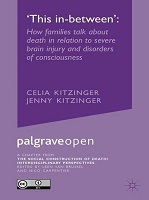Chapter 12 This in-between
How families talk about death in relation to severe brain injury and disorders of consciousness
Author(s)
Kitzinger, Celia Clare
Kitzinger, Jenny
Collection
WellcomeLanguage
EnglishAbstract
Thanatological research in the social sciences and the humanities acknowledges that death is culturally and socially embedded. The idea of the social construction of death has been taken on board, albeit slowly, by the social and cultural study of death, but explicit reflections on the underlying ontologies and epistemologies of this paradigm remain scarce. This edited volume aims to strengthen the paradigmatic reflections about the social construction of death in thanatology and contribute to a theoretical reinforcement of the field. It also puts death and dying more explicitly on the agenda of social constructionist and social constructivist research in general, arguing that the study of death is important for these approaches. The thirteen contributions gathered in this volume, written by well-established scholars from a variety of disciplines (including sociology, anthropology, media and cultural studies, and political sciences), theorise the social construction of death and dying, and deploy it to analyse a wide variety of meaning-making practices in societal fields such as ethics, politics, media, medicine and family.
Keywords
social constructivist research; death; social constructionist research; thanatology; social constructivist research; death; social constructionist research; thanatology; Brain death; Consciousness; Disorders of consciousness; Family; Health technology in the United States; Life support; Minimally conscious state; Persistent vegetative state; Traumatic brain injuryDOI
10.1057/9781137391ISBN
9781137391926;9781137391919OCN
1076788413Publisher
Springer NaturePublisher website
https://www.springernature.com/gp/products/booksPublication date and place
Basingstoke, 2014Grantor
Imprint
Palgrave MacmillanClassification
Cultural studies
Media studies
Sociology
Sociology: death and dying


 Download
Download Web Shop
Web Shop